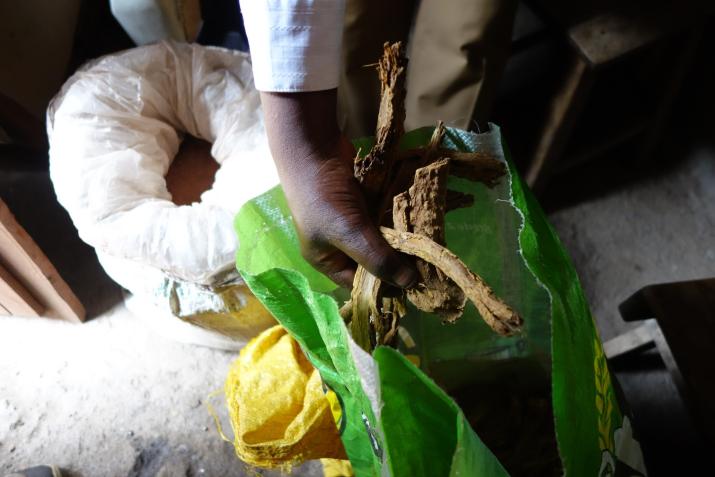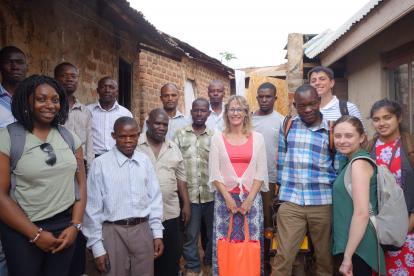
A traditional healer in Uganda shows the plants and herbs he uses in treatments.
Published May 24, 2021, last updated on June 14, 2021 under Research News
In Uganda, a person who suffers the repeated seizures associated with epilepsy is most likely to seek help first from a traditional or spiritual healer, which may not be surprising considering that two-thirds of Ugandans say they believe seizures may be caused by spiritual influences, such as ancestral determinism, witchcraft, or demonic possession.
But belief is not the only reason many Ugandans rely on healers. In a country with one medical provider for every 20,000 residents, there are by some estimates 100 times as many traditional and spiritual healers, offering an around-the-corner convenience an under-resourced health system like Uganda’s can’t hope to match.
“They are far more accessible for those in a community who can’t necessarily get to a clinic, and certainly not to a regional or national hospital,” says Deborah Koltai, Ph.D., an associate professor of psychiatry and behavioral sciences whose team recently completed one of the first countrywide surveys of Ugandans’ attitudes about epilepsy. “For a very large proportion of the population, (traditional and spiritual healers) are considered and consulted as the experts on this disorder because they are believed to negotiate the intersection of physical and spiritual worlds.”
And that makes the role of healers a unique and challenging variable in Uganda’s efforts to address its growing burden of epilepsy, a chronic, but treatable disorder that frequently goes undiagnosed in low- and middle-income countries. Around 80 percent of people with epilepsy live in such settings, and it’s estimated that three-quarters of them – roughly 40 million people globally – don’t receive adequate care.
Koltai, who directs the Uganda epilepsy program for the Duke Global Neurosurgery and Neurology (DGNN) division, says her team’s research shows that Ugandans who consult traditional or faith healers about seizures are delayed in seeking medical care by an average of two years, if they show up at all. But at the same time, she says understanding and respecting the influence of healers may be essential to improving biomedical treatment.
“It’s so important to be open-minded about what people believe,” she says, “not just because we want to be respectful, but because we want to be effective. We need to understand the context in which we are working.”
Over the past few years, the DGNN team has convened town halls and focus groups with several dozen traditional and faith healers, seeking to better understand how they interact with and treat people suffering from seizures. Healers operate in a shadowy periphery of official practice – Uganda only passed laws to register and recognize them in 2019 – and so mistrust runs in both directions between healers and the government. But in their interviews, Koltai and her colleagues found areas where medical practitioners and healers can benefit from greater cooperation.
Koltai points out, for example, that most Ugandans have pluralistic beliefs about the physical and spiritual worlds, and many pursue traditional or faith healing even as they seek medical treatment. Knowing what herbs a healer uses in treatments could help medical providers spot possible drug interactions with medications. On the other hand, if medical providers ignore or scoff at traditional healing, they risk their patients losing trust in biomedical treatment, Koltai says.
To that end, the DGNN team is working with Duke global health professor Neil Prose, an expert on patient communication, to develop training modules to help frontline providers talk directly and tactfully with patients about their visits to traditional healers. The lessons will be part of new training materials distributed across the country by Uganda’s Ministry of Health.
The Duke team is also designing community education programs about the causes and treatments available for epilepsy, with the aim of reducing isolation and stigma that often prevents people who experience seizures from seeking treatment.”

Deborah Koltai (middle) and the Duke...
Understanding the cultural factors affecting epilepsy care fits with DGNN’s holistic approach in Uganda. Duke neuroscientists have been working in the country for more than a decade, focusing initially on setting up training programs to increase the number of neurosurgeons there. When the team began looking at epilepsy in 2017, there were no countrywide studies to even suggest how many Ugandans had the disorder.
“As we began to do this work, we were trying to approach this in a very humble manner,” says Tony Fuller, M.D., DGNN’s associate director and an assistant professor of neurosurgery and global health. He says the team reached out to everyone working with epilepsy patients – from neurologists to psychiatrists to community health workers – to be sure they had a full picture of the barriers to diagnosis and care. The commitment to listen, he says, has helped the team remain receptive to ideas they may not have considered in their efforts to improve care.
As part of that multifaceted approach, DGNN helped Ugandan colleagues launch the country’s first dedicated epilepsy clinic in 2019 at Mbarara Regional Referral Hospital in western Uganda. The clinic has seen more than 1,500 patients since opening and serves as a focal point for education and efforts to improve care.
The team has also published a batch of research papers covering everything they had learned about structural and cultural barriers to epilepsy care in Uganda. The 11 articles, which were published in a special issue of the journal Epilepsy & Behavior, are informing Uganda’s Ministry of Health as it develops new guidelines for epilepsy treatment. Koltai and Fuller hope the journal also provides a road map for other low- and middle-income countries struggling with the multiple barriers that prevent people from accessing epilepsy treatment.
But at the heart of those papers is a simple ethos, one that permeates DGNN’s research on the pervasive influence of spiritual beliefs and traditional healers: Listen with humility and respect.
“It’s really just about showing up and doing whatever is necessary to ensure that collectively we’re headed toward our mission,” says Fuller, “which is ultimately to improve care for epilepsy patients in Uganda."


